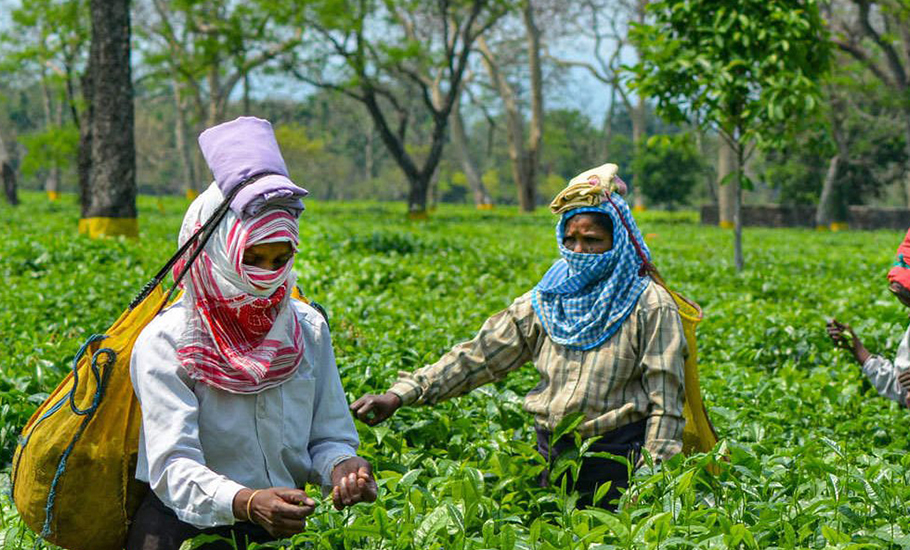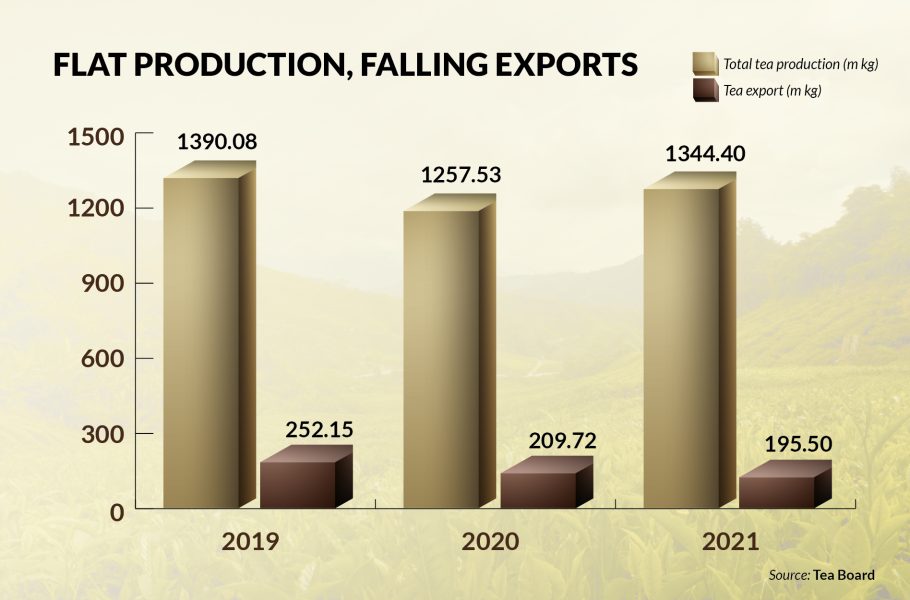
With worker trouble brewing over new law, Tea Board's export target brings no cheer
Sri Lankan crisis offers opportunity, but current slump in tea production and exports, and apprehension over new Bill make target seem too ambitious

In a bid to capture the global market opportunity created by the Sri Lankan economic crisis, the Tea Board has scaled up its 2025 export target to 104.5 million kg. Sri Lanka is a significant tea exporter, and the current situation does hold promise for the Indian industry, but the Tea Board’s new target brings little cheer to industry stakeholders.
According to them, the target appears unrealistic. Industry sources pointed out that the tea sector in India is staring at an uncertain future due to multiple factors, raising doubt about the feasibility of the ambitious target set by the board.
Also read: From G7 nations to traders to farmers, India’s wheat export ban has pleased none
The board, under the stewardship of its new chairman Sourav Pahari, set a target of exporting 240 million kg of tea this year and 300 million kg by 2025. Industry sources are sceptical about achieving the target as tea exports have seen a stiff fall over the past two years and the ongoing Russia-Ukraine war is likely to lead to a further decline this year.
Labour unrest in the offing
Moreover, the new tea law that the BJP government at the Centre proposes to enact is likely to trigger labour unrest. Almost all the trade unions active in the tea gardens are opposing the new law, terming it anti-worker.
Any disruption by tea labourers will further bring down tea exports, which are already plummeting.
According to Tea Board data, total exports plunged to 195.50 million kg last year, from 209.72 million kg a year before. In 2019, India exported 252.15 million kg of tea. The reason, as the board recently observed, is that Indian tea does not match up to the quality requirement of the international market.

Further, tea production in the country has also stagnated as most of the gardens are ageing. Last year, India produced 1,344.40 million kg, marginally more than the 1,257.53 million kg produced in 2020 and less than the 1,390.08 million kg produced in 2019.
Also read: There’s no end to Telangana turmeric farmers’ misery
More importantly, the panacea that the government has proposed to boost export and enhance the quality of tea – the new law – is expected to brew more trouble than cure the troubles afflicting the sector, industry sources apprehend.
Replacement for Tea Act
The Union government is expected to introduce the Tea (Development and Promotion) Bill, 2022 in the ensuing monsoon session of Parliament to replace the 1953 Tea Act.
The Commerce Ministry recently said the ‘archaic’ 1953 legislation would be repealed to promote ease-of-doing-business and boost export and production.
The proposed law would recognise small tea growers, provide them with training, and lay stress on capacity building, value addition and embracing new technology, said Tea Board sources.
But many in the industry believe the new legislation could boomerang as 10 out of 11 central trade unions have vehemently opposed many of its provisions. “The proposed legislation will adversely affect the tea industry as it seeks to do away with the regulatory power of the Tea Board,” said Saman Pathak, a senior Centre of Indian Trade Unions (CITU) leader from Darjeeling.
The Bill, a copy of which was accessed by The Federal, excludes Chapter 3 (Control over the extension of tea plantation) and Chapter 4 (Control over export of tea and tea seed) of the existing Tea Act.
Also read: Wheat, maize and rice cultivation killing global biodiversity
“The exclusions of such provisions would take away the regulatory powers of the board,” Pathak said. The obliteration of the regulatory power would mean the board would have no role in workers’ welfare, he said, adding it would undermine the interest of the labour-intensive tea industry.
Commercial use of tea land
The omission of Chapters 3 and 4 of the existing law in the proposed legislation will open up tea land to unrestricted commercial use, Pathak rued.
He further said the ‘anti-worker’ nature of the proposed legislation is reflected by the fact that it does not include the worker community as a stakeholder. The trade unions also object to the exclusion of Chapter 3A that deals with ‘management or control of tea undertakings or tea units by the Central government in certain circumstances’. This, they say, is an abdication of responsibility by the Centre to protect the industry.
Pathak said the proposed legislation is akin to the farm laws and is likely to spark workers’ protests.

